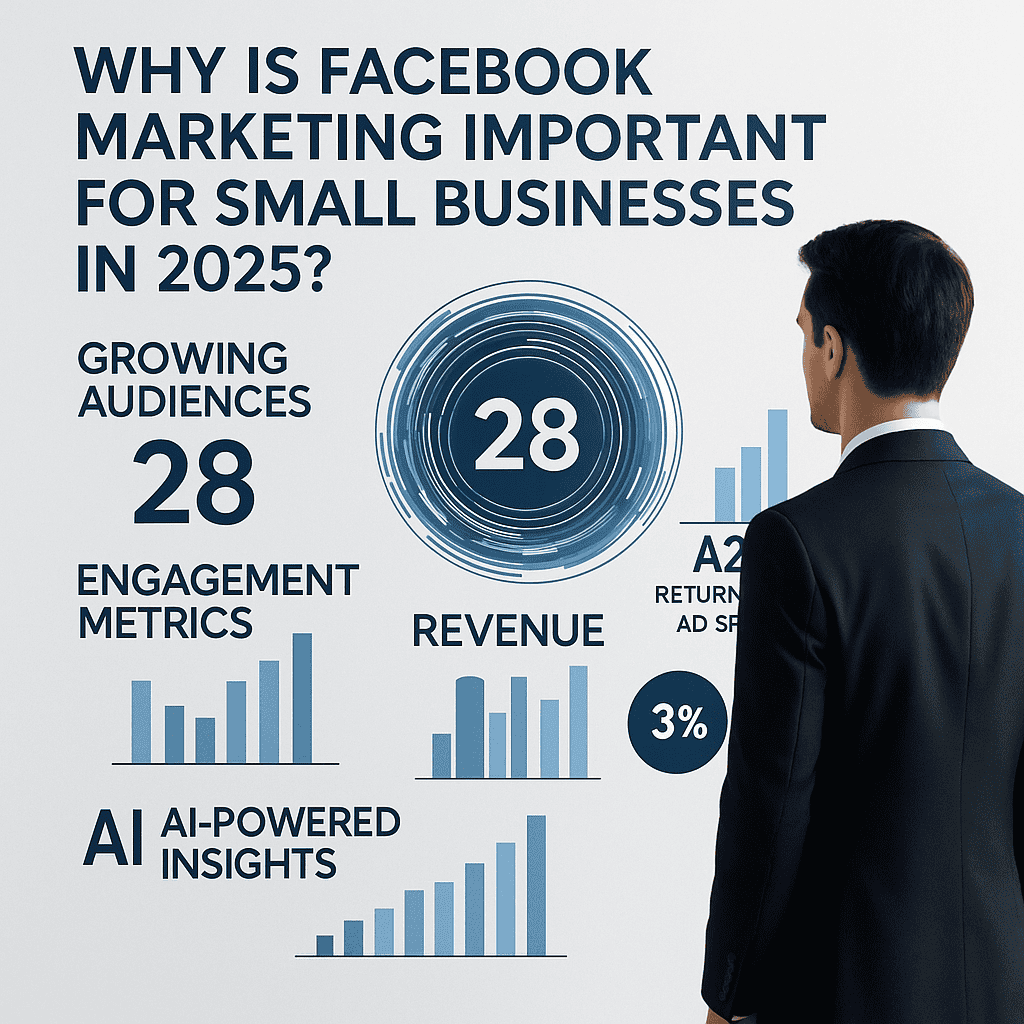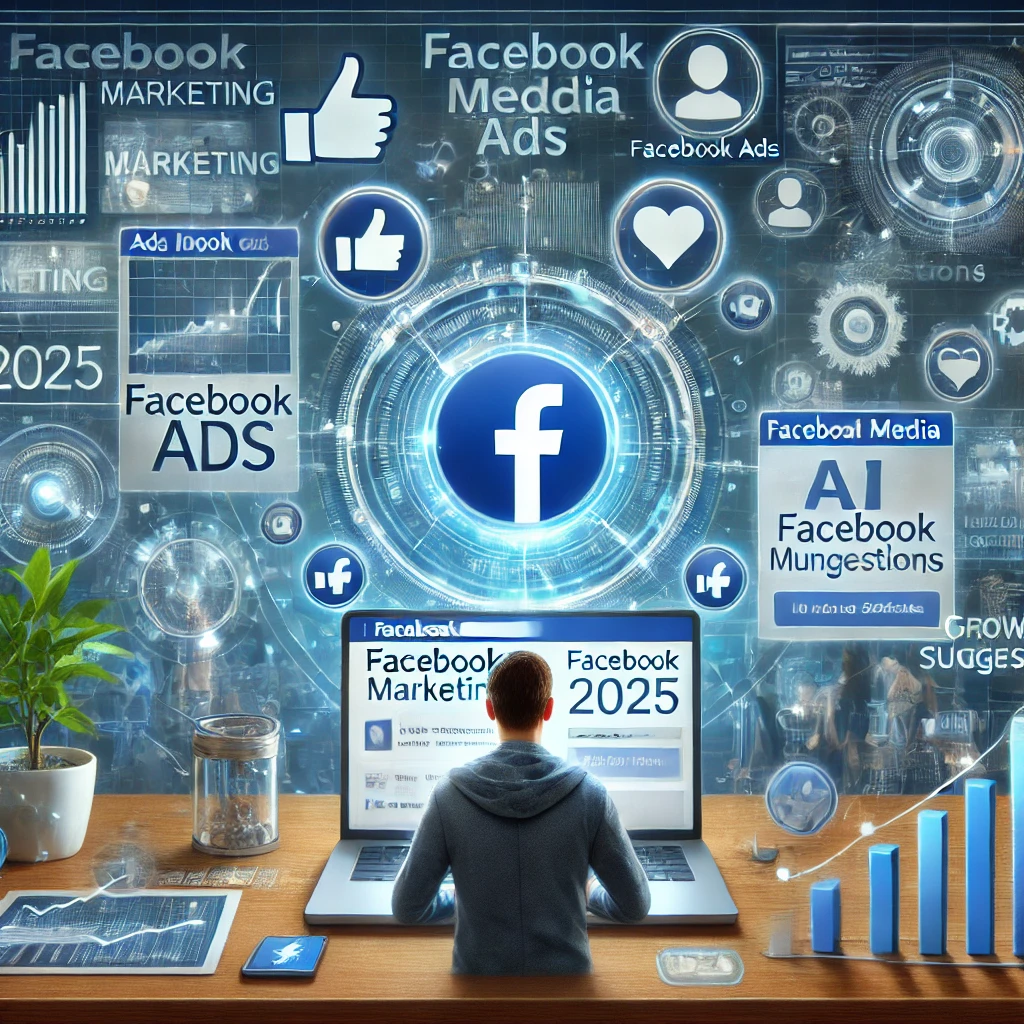Introduction
In 2025, Facebook will remain one of the USA’s most powerful platforms for small and medium-sized businesses (SMBs). With over 200 million businesses already using Facebook, leveraging this platform effectively can be a game-changer for brand visibility, customer engagement, and revenue growth. For instance, [SMB A] saw a [X% increase in revenue] after implementing a targeted Facebook marketing campaign.
The Evolution of Facebook Marketing
Facebook marketing has evolved significantly over the years, with AI-powered tools, enhanced targeting options, and more interactive ad formats. As the digital landscape continues to shift, businesses that fail to adapt will struggle to stay competitive.
Key Reasons Why SMBs Should Invest in Facebook Marketing
1. Massive Audience Reach
Facebook’s nearly 3 billion monthly active users present a vast and diverse audience, which is ideal for businesses aiming to expand their reach. Whether you’re targeting local customers or eyeing a nationwide audience, Facebook’s audience segmentation tools ensure your business gets in front of the right people, paving the way for growth and expansion.
2. Cost-Effective Advertising
Compared to traditional advertising channels, Facebook Ads offer a high return on investment (ROI). With as little as $5 per day, businesses can run targeted campaigns that drive engagement and conversions, demonstrating the financial savvy and resourcefulness of SMBs.
3. Advanced Targeting Capabilities
Facebook’s AI-driven targeting allows businesses to reach their ideal audience based on:
- Demographics (age, gender, location)
- Interests and behaviours
- Lookalike audiences (similar to existing customers)
- Retargeting past visitors and leads
4. AI-Powered Optimization
Facebook’s AI algorithms help businesses automatically optimize ads for better performance. Features like dynamic creative testing, which allows you to test multiple ad variations to find the most effective one; automated budget allocation, which ensures your budget is spent on the most effective ads; and predictive analytics, which uses data to forecast future ad performance, make advertising more efficient and profitable.
5. Engagement and Community Building
Unlike traditional advertising, Facebook allows businesses to engage directly with customers through:
- Posts, stories, and reels
- Facebook Groups
- Messenger and chatbots
Building an online community fosters brand loyalty and encourages customer interaction.
6. E-commerce and Lead Generation Integration
Facebook makes it easy for businesses to drive sales through:
- Facebook Shops (seamless online shopping experience)
- Lead Generation Ads (collect leads without leaving Facebook)
- Instant Forms (simplifying customer sign-ups)
7. Competitive Advantage
With most businesses investing in Facebook marketing, staying ahead of competitors requires a strategic approach. Companies that fail to leverage the platform effectively risk losing potential customers to more digitally savvy competitors, highlighting the need for SMBs to be strategic and competitive in their approach.
Future Trends in Facebook Marketing for SMBs
- AI-driven content personalization to improve ad engagement
- Enhanced automation for ad management
- Integration with AR/VR experiences
- Stronger emphasis on video content and reels

AI-driven content personalization has emerged as a transformative strategy for enhancing ad engagement in today’s digital landscape. This approach tailors advertisements to individual user preferences and behaviors by leveraging advanced algorithms and machine learning techniques.
This personalization process involves analyzing vast amounts of user data, such as browsing history, demographic information, and past interactions with content. As a result, brands can create highly relevant and appealing advertisements that resonate with specific audiences. For instance, users who frequently engage with fitness content might see targeted ads for new workout gear or healthy meal plans. In contrast, another user interested in travel could receive offers for vacation packages or travel accessories.
Moreover, AI-driven personalization doesn’t just improve click-through rates. Still, it enhances the overall user experience by delivering content that aligns more closely with individual interests. This leads to increased brand loyalty, as users are more likely to engage with brands that understand and anticipate their needs. Ultimately, integrating AI in content personalization represents a significant leap forward in creating compelling, engaging advertising experiences that convert viewers into customers.
Enhanced automation for ad management refers to implementing advanced technologies and software solutions that streamline and optimize the process of creating, managing, and analyzing advertising campaigns. This includes using artificial intelligence and machine learning algorithms to automate ad placement, budgeting, targeting, and performance tracking tasks.
With enhanced automation, advertisers can benefit from real-time data analysis, allowing quicker decision-making and campaign adjustments based on performance metrics. Additionally, dynamic ad personalization enables tailored messaging to specific audience segments, improving engagement and conversion rates. Overall, enhanced automation in ad management leads to increased efficiency, reduced manual workload, and more effective utilization of advertising budgets.
Integration with augmented reality (AR) and virtual reality (VR) experiences involves seamlessly incorporating digital elements into the physical world or creating entirely immersive digital environments. This can enhance user engagement by providing interactive and visually captivating experiences.
In AR, digital overlays can be superimposed onto the real world through devices like smartphones or AR glasses. For instance, imagine using an AR application that allows users to visualize how furniture would look in their home before purchasing. By utilizing real-time object recognition and tracking, users can see lifelike 3D models of products in their actual surroundings, making informed decisions more straightforward.
On the other hand, VR creates entirely virtual environments where users can interact with a computer-generated world. This can be especially powerful in training, entertainment, and education. For example, a VR training program for medical professionals might simulate real-life surgical procedures, allowing users to practice skills in a safe, controlled environment.
Integrating AR/VR experiences can also extend to social interactions, such as virtual meetings where participants feel they share the same space, enhancing collaboration regardless of geographical barriers. As technology evolves, we can expect even more innovative uses of AR and VR, providing immersive experiences that blend seamlessly with our daily lives.
Stronger emphasis on video content.
In today’s digital landscape, there is a significant shift toward prioritizing video content, especially short-form videos and reels. The visual nature of these formats engages audiences more effectively, capturing their attention in a way that static images or text alone cannot. Platforms like Instagram, TikTok, and YouTube Shorts have seen meteoric popularity, demonstrating that users are increasingly drawn to dynamic, visual storytelling.
To capitalize on this trend, brands and content creators should produce high-quality video material that resonates with their target audience. This could involve crafting captivating narratives, utilizing eye-catching visuals, and experimenting with creative editing techniques to enhance storytelling. Additionally, incorporating engaging elements such as music, effects, and on-screen text can further elevate the viewer’s experience.
By embracing a stronger emphasis on video content and reels, businesses can increase their visibility and engagement on social media platforms and foster a deeper connection with their audience. This approach allows for more creative expression and opens doors to innovative marketing strategies to set a brand apart in a competitive digital realm.
8. Understanding Success with Facebook Marketing for SMBs
When evaluating Facebook marketing, it is essential to acknowledge that different industries may experience varying degrees of success. Sectors such as retail, e-commerce, and local services typically see better results due to the platform’s focus on visual content and community engagement. For instance, a local restaurant may thrive by sharing enticing images of its dishes. At the same time, an e-commerce business can significantly benefit from targeted ads that showcase products directly to interested consumers. Exploring case studies or success stories within your specific industry can provide valuable insights into strategies that have proven effective for similar businesses.
9. Measuring Success in Facebook Marketing
To enhance the effectiveness of your marketing efforts., it is crucial to measure success accurately. Key performance indicators (KPIs) such as engagement rates, click-through rates (CTR), conversion rates, and return on ad spend (ROAS) should be monitored regularly. Utilizing Facebook’s Insights tool can yield valuable data on how your audience engages with your ads and posts, allowing for data-driven decision-making. Additionally, setting clear objectives before launching a campaign will aid in evaluating its effectiveness over time, whether the goals involve increasing brand awareness, generating leads, or driving sales.
10. Challenges of Facebook Marketing for SMBs
While Facebook provides numerous advantages, SMBS must know the potential downsides and challenges. Changes in algorithms can impact the visibility of posts and ads, meaning businesses may experience fluctuations in engagement levels unexpectedly. Furthermore, the competitive landscape is becoming increasingly crowded, making standing out in users’ feeds more challenging. Managing and continuously optimizing campaigns also requires time and expertise, which can challenge smaller businesses with limited resources. SMBS must remain informed about these challenges and develop strategies to address them while effectively harnessing the platform’s potential.
By addressing these questions and filling in knowledge gaps, SMBs can navigate their Facebook marketing strategies more effectively, ensuring they make informed decisions that foster sustained growth and engagement.
Conclusion
Facebook marketing is no longer optional for small businesses; it’s necessary. By leveraging Facebook’s advanced tools and strategies, SMBs can increase brand awareness, generate leads, and boost revenue in 2025 and beyond.
Partner with Intrigue IT Solutions for Expert Facebook Marketing
Looking to elevate your Facebook marketing strategy or need expert guidance analyzing your business’s social media potential? The team at Intrigue IT Solutions is here to help.
📧 Email: [email protected]
🏢 Address: 13151 Emily Road #260, Dallas, TX 75240
📞 Phone: 469-878-3479
🌐 Website: www.intrigueit.com

